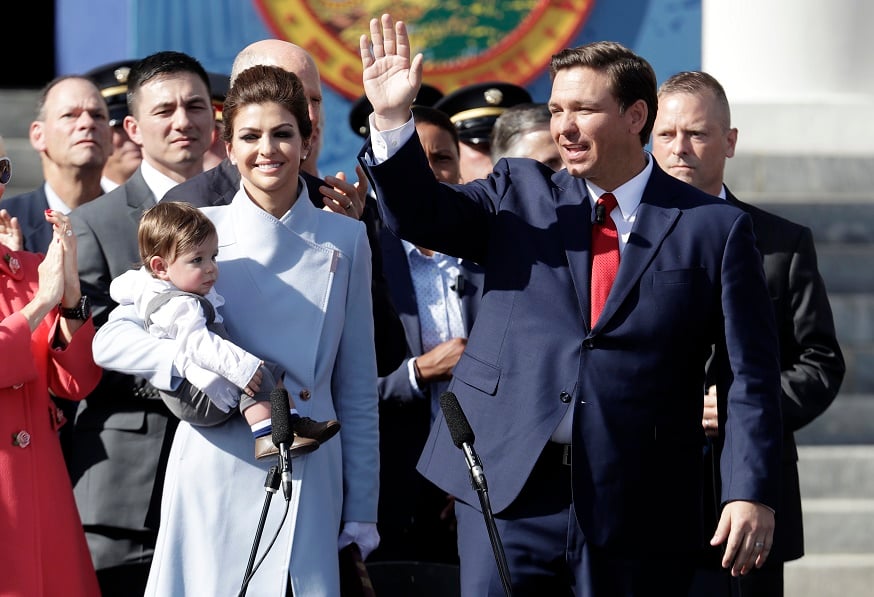(CN) – Newly inaugurated Republican Governor Ron DeSantis appointed his third justice to the Florida Supreme Court on Tuesday, the last of his three picks for the seven-member panel that solidify the court's shift to the right.
Carlos Genaro Muñiz, general counsel for the U.S. Department of Education, becomes the 89th justice of the state's highest court.

Muñiz, 49, also served as deputy general counsel for former Governor Jeb Bush and chief of staff for former Florida Attorney General Pam Bondi, both Republicans.
He has worked for some of the biggest law firms in the state, including GrayRobinson and McGuire Woods. He is also a member of the conservative Federalist Society.
In Tuesday’s announcement at the governor's mansion, DeSantis said Muñiz fits the role of the "strict constitutionalist" judge he was looking for.
"The other thing is [Muñiz] really understands the separation of powers and he understands the proper role of the court," DeSantis said. "He has worked extensively in various aspects of Florida government, so I think he's approaching it understanding the role of the legislative branch, which he worked in with the speaker of the House. He understands the governor's role. He understands the attorney general's role.”
"And I think that's a very useful perspective to be able to bring to the court, particularly because one of the critiques I have had of the court is they have not understood their proper jurisdiction and they've expanded it beyond where they should,” the governor continued.
Muñiz has no judicial experience. DeSantis said he was looking for someone from a "practitioner's perspective."
"I like the way that meshes with the people who are there and the experiences they have had," he said, noting an attorney has not been appointed to the court in 24 years.
In his first two weeks in office, DeSantis has filled three vacancies on the Florida Supreme Court after Justices R. Fred Lewis, Barbara Pariente and Peggy Quince left due to mandatory retirement.
The day after his inauguration, DeSantis appointed Barbara Lagoa, the former chief judge of the Third District Court of Appeal in Miami. She became the first Hispanic woman to serve on the Florida Supreme Court.
Last week, DeSantis tapped Robert Luck, another appellate judge from Miami and a former federal prosecutor.
The three new justices, all contributors or members of the Federalist Society, join Chief Justice Charles Canady and Justices Ricky Polston and Alan Lawson, who are considered part of the conservative wing of the court. Justice Jorge Labarga often acts as a swing vote.
The three retiring justices – Pariente, Lewis and Quince – were considered more liberal. They frequently struck down redistricting provisions and abortion restrictions pushed by former Governor Rick Scott and the Republican-controlled Legislature.
DeSantis and his Democratic opponent in the gubernatorial election, Andrew Gillum, often talked about the importance of who picked the next three justices.
DeSantis frequently derided the "judicial activism" of the Florida Supreme Court and vowed to appoint strict constitutionalists.
In his remarks Tuesday, Muñiz said he agreed with the governor's judicial philosophy.
"The role of a judge is to preserve the Constitution, not to add to it or subtract from it," Muñiz said. "I believe strongly in judicial independence, but judges have to earn that independence through their fidelity to the Constitution."
Muñiz does not have to be confirmed by the Florida Legislature and will take his seat immediately.
DeSantis picked the justices from a list compiled by the Florida Supreme Court Judicial Nominating Commission. The nine-member nominating commission, all appointed by former Governor Scott, sifted through 58 applications over the last two months to whittle the list down to 11 people.
All of the judges on the list were appointed by Republican governors and six of them by Scott himself.
Some groups such as the NAACP criticized the list as lacking in diversity. There were no African-Americans on the list, which means for the first time in 36 years, the Florida Supreme Court will not have a black justice.
This has prompted some lawmakers, such as state Senator Perry Thurston, to call for legislation limiting the governor's powers to nominate judges.
"With his last appointment to Florida's Supreme Court imminent, we are again urging Gov. Ron DeSantis to maintain diversity on our highest court," said Thurston, a Democrat from Ft. Lauderdale, in a statement last week. "We know there are candidates not being considered that are highly qualified and represent Florida's diversity."
In the announcement Tuesday, DeSantis alluded to that criticism.
"Just within two or three weeks in office, I've already put more Hispanics on the Supreme Court than any other governor in history," he said.
The appointment process for new justices was mired in controversy last year when Scott declared he would choose the new justices before leaving office. Scott’s intentions provoked a lawsuit filed by the League of Women Voters and liberal group Common Cause. In October, the Florida Supreme Court ruled the incoming governor has “sole authority” to appoint the justices.
The groups wanted the top state court to invalidate the nominating process, but the justices declined.
This year, the Florida Supreme Court is set to rule on cases involving the controversial “stand your ground” law, gun rights and Miami Beach’s citywide minimum wage.
Subscribe to Closing Arguments
Sign up for new weekly newsletter Closing Arguments to get the latest about ongoing trials, major litigation and hot cases and rulings in courthouses around the U.S. and the world.








